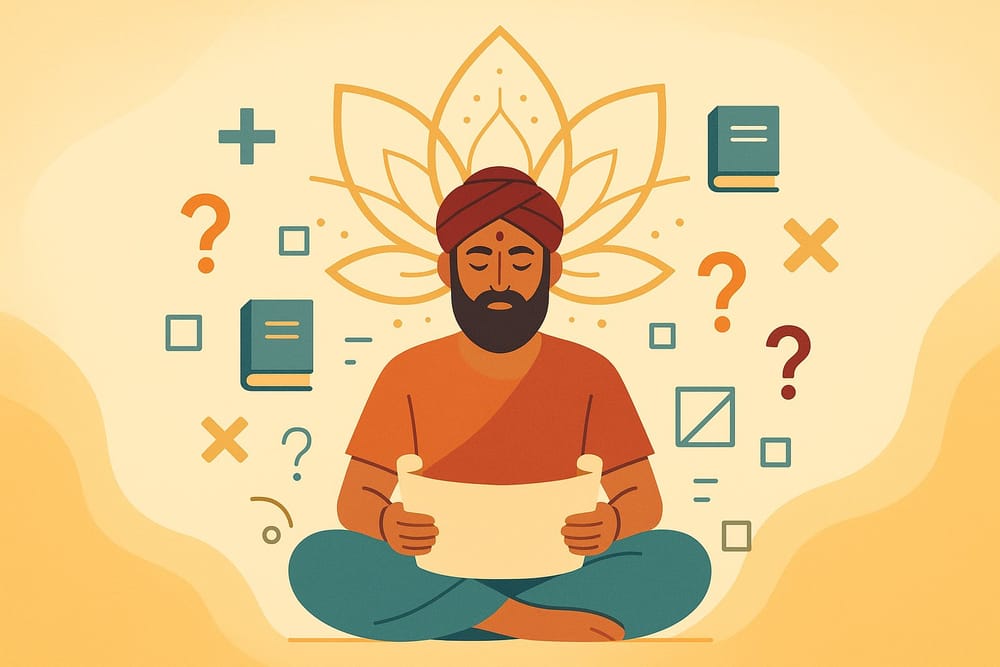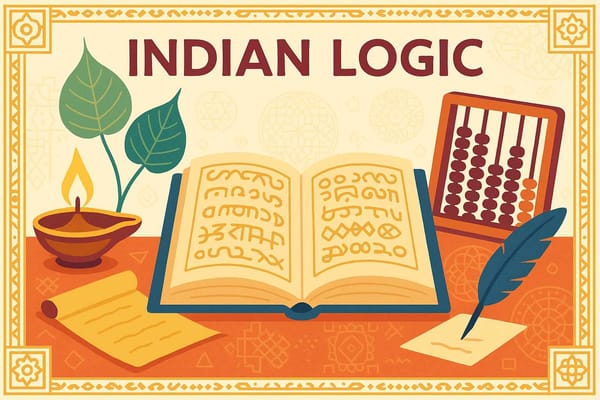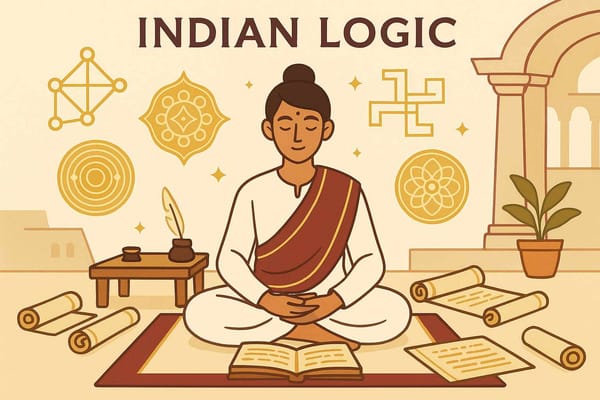
Indian Logic for UGC NET 2025 - Ace Exam with MCQs & PYQs
The journey of preparing for the UGC NET exam often feels like a deep dive into an ocean of knowledge. For many, the Indian Logic section can seem like the most profound, and perhaps intimidating, part of this ocean. But what if I told you that this isn't just another subject to memorize? It's a part of our heritage, a way of thinking that our ancestors perfected thousands of years ago. It’s the art of clear thinking, something that helps not just in the exam hall but in life itself. So, let's embark on this journey together and make friends with Nyaya philosophy, turning it from a challenge into your greatest strength for the UGC NET 2025 exam.
First Things First: What Exactly is Indian Logic?
At its heart, Indian Logic, known as Nyaya, is the science of right reasoning and correct knowledge. Think of it as a toolkit for your mind. The ancient sages, especially Gautama Muni who penned the Nyāya Sūtras, weren't just creating rules; they were mapping out how we humans can arrive at the truth. This system is built upon the idea of *Pramāṇa*, which simply means the valid means of knowledge.
The UGC NET syllabus often revolves around these Pramāṇas, which are primarily four in the Nyaya school:
- Pratyakṣa (Perception): This is the most direct way of knowing something – through your senses. When you see the sun rise or feel the warmth of a cup of chai, that's Pratyakṣa. It’s knowledge that comes directly from your experience, without any middleman.
- Anumāna (Inference): This is the magic of logical deduction. You see smoke billowing from a distant hill and you infer that there must be a fire. You haven't seen the fire directly, but you've connected the dots based on past experience. This is the cornerstone of many UGC NET questions.
- Upamāna (Comparison or Analogy): Imagine explaining to a friend what a 'wild ox' (nilgai) looks like by saying, "It's a large animal that looks something like a cow." That's Upamāna! You are using a known object (cow) to describe an unknown one (nilgai). It's learning through comparison.
- Śabda (Verbal Testimony): This is knowledge gained from a reliable source, whether it's a sacred text, a wise teacher, or an expert in a field. When you trust a doctor's prescription or a guru's teachings, you are relying on Śabda. This highlights the profound importance of trustworthy sources of knowledge in our traditions.
While some philosophical schools accept more or fewer Pramāṇas, the Nyaya system's focus on these four makes it a central topic for the exam. Understanding these isn't just about theory; it’s about grasping the very framework of how we think and validate our thoughts.
Cracking the Code: Key Topics for the UGC NET Exam
Now that we have the foundation, let's look at the specific areas that the question paper loves to focus on. Being smart about your preparation means knowing where to direct your energy.
Mastering Inference (Anumāna)
Inference is a big one. It’s not just one idea, but a process with its own types. The exam often tests your understanding of these nuances:
- Pūrvavat Anumāna: This is when you infer an unperceived effect from a perceived cause. A classic example is seeing dark, heavy clouds gathering in the sky and predicting that it will rain soon. You're reasoning from cause to a future effect.
- Śeṣavat Anumāna: This is the opposite – you infer an unperceived cause from a perceived effect. If you wake up and see the roads are wet, you infer that it must have rained at night. You are moving from the effect back to the cause.
- Sāmānyato-dṛṣṭa Anumāna: This is inference based on a general rule of co-existence, not a direct causal link. For example, when we see someone's behaviour changing, we might infer a change in their emotional state, based on our general understanding of human nature.
Spotting the Traps: Hetvābhāsa (The Fallacies of Inference)
This is where many aspirants get stuck! A *Hetvābhāsa* is basically a faulty reason, an error in logic that makes an argument seem valid when it's not. Think of it as a logical illusion. Recognizing these fallacies is a skill the exam heavily tests. For instance, an *Asiddha* fallacy is when the reason itself is unproven. It's like building a house on a foundation of sand – the whole argument collapses.
The Golden Rule: Vyāpti (Invariable Concomitance)
Vyāpti is the universal, unconditional relationship between the reason (hetu) and the thing to be inferred (sadhya). The most famous example is, "Wherever there is smoke, there is fire." This relationship is absolute. There are no exceptions. Understanding Vyāpti is crucial because, without it, no inference can be valid. UGC NET questions often test this concept by presenting scenarios where you need to determine if a valid Vyāpti exists.
A Practical Study Plan for Indian Logic
Knowing the concepts is one thing, but acing the MCQs is another. With the exam scheduled between December 31, 2025, and January 7, 2026, a structured approach is your best friend.
Befriend Previous Year Questions (PYQs)
This is non-negotiable. Solving PYQs is like having a conversation with the exam setter. You start to understand the patterns, the favourite topics, and the clever ways questions are framed. Don't just solve them; analyze them. Why was this option correct and the others wrong? This deep analysis is what will build your confidence and help you master the subject.
Go Beyond Memorization
Indian Logic is not a list of facts to be rote-learned. It's a system. Try to create mind maps or simple diagrams connecting concepts like Pramāṇa, Anumāna, Hetu, and Vyāpti. When you can visually see how they relate to each other, you'll never forget them. And remember, the exam has no negative marking, so a well-reasoned guess based on a solid conceptual understanding is always better than leaving a question unanswered.
Create Your Own Notes
When you write something in your own words, your mind processes it on a much deeper level. Summarize each Pramāṇa with your own example. List the Hetvābhāsas and create a funny or memorable situation for each one. These personal notes will be your most valuable resource for quick revision before the D-day.
Even if you have no prior background in Indian philosophy, you can absolutely master this section. Start with the basics explained here, build your foundation, and then gradually move to more complex ideas. The journey into Nyaya is a gradual unfolding of clarity.
The Enduring Wisdom of Nyaya in Our Lives
It's easy to see this as just an academic exercise, but the principles of Nyaya are incredibly relevant today. They teach us to question what we hear, to look for valid reasons before believing something, and to spot faulty logic in news debates or social media posts. In a world full of information and misinformation, the ability to think clearly and logically is a superpower. The study of Indian Logic is, in essence, a training for the mind.
This pursuit of clear knowledge, or *Jnana*, is a beautiful path in itself. For those who wish to delve deeper into the philosophical underpinnings of our culture, exploring concepts beyond exam syllabi can be incredibly rewarding. You might find our article on The Path of Knowledge & Devotion a wonderful companion to your intellectual and spiritual journey.
Your Companion in Faith and Knowledge
At Bhaktilipi.in, we believe that knowledge and devotion go hand in hand. We are dedicated to bringing the timeless stories and profound wisdom of our traditions to you in a way that feels both authentic and accessible. While you prepare for your academic goals, we are here to support your spiritual curiosity.
Stay connected with a community that cherishes our heritage. Follow us for daily inspiration and insights:
As you prepare for the UGC NET, remember that every concept you learn is a part of a magnificent philosophical tradition. Approach it with curiosity and respect, and you will not only score well but also enrich your own understanding of the world. Best of luck with your preparation! You have everything it takes to succeed.
A passionate group of people dedicated to preserving India's knowledge of Dharma, Karma, and Bhakti for ourselves and the world 🙏.
Comments
Related in

Indian Logic: UGC NET MCQs & Questions for 2025 Exam
UGC NET की तैयारी करना किसी आधुनिक तपस्या से कम नहीं लगता, है ना? हर दिन घंटों की पढ़ाई, अनगिनत नोट्स और एक ही लक्ष्य - सफलता। इस कठिन यात्रा में, कुछ

Indian Logic for UGC NET 2025 - Secrets You Need Now
The journey to crack a competitive exam like the UGC NET can sometimes feel like a long, winding road. We gather books, make notes, and spend countless hours studying. But every now and then, we come across a topic that isn’t just about marks; it’s a doorway into

Indian Logic for UGC NET 2025: Your Key to Exam Success
Preparing for the UGC NET exam often feels like embarking on a great quest. You gather your books, chart your study plan, and then you come across a section in Paper 1: Indian Logic. For many of us, this can feel both intimidating and intriguing. It's a world
